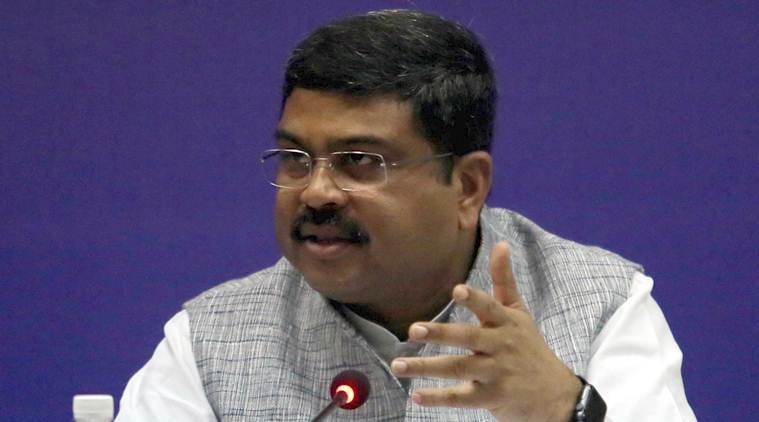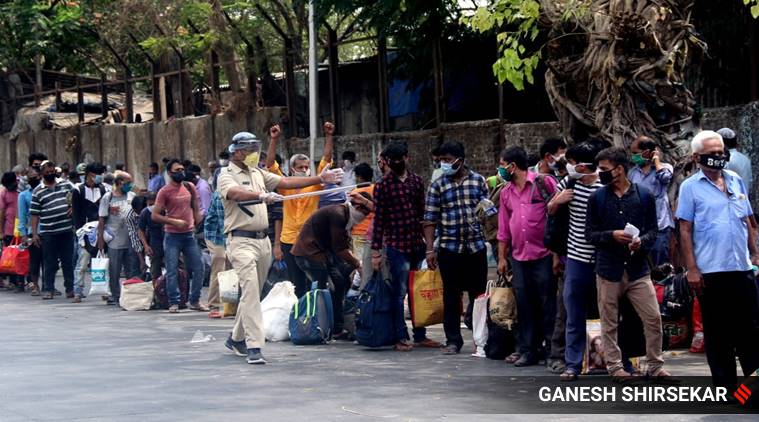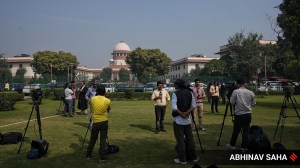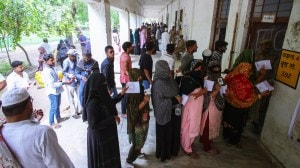- India
- International
Lack of sensitivity of some states led to migrant issue: Dharmendra Pradhan
Dharmendra Pradhan, Union Minister of Petroleum & Natural Gas and Steel, speaks to The Indian Express on the migrant labour crisis, changes in labour laws and the Covid-19 impact on steel and oil sectors. Excerpts
 The Minister for Petroleum and Natural Gas, and Steel, who is on a two-day visit to Chhattisgarh, was talking to reporters on his arrival at the Swami Vivekananda Airport here. (Express file photo by Prem nath Pandey)
The Minister for Petroleum and Natural Gas, and Steel, who is on a two-day visit to Chhattisgarh, was talking to reporters on his arrival at the Swami Vivekananda Airport here. (Express file photo by Prem nath Pandey)
Dharmendra Pradhan, Union Minister of Petroleum & Natural Gas and Steel, speaks to The Indian Express on the migrant labour crisis, changes in labour laws and the Covid-19 impact on steel and oil sectors. Excerpts
The country has been witnessing visuals and images of hundreds of helpless migrant workers walking to reach their home states. Did the government foresee such a situation?
The issue is with the states where the migrants are working. People from eastern India work in western, southern and northern India…. In this issue, there are three players — the central government, states that send the workers and the states that receive them. The government of India’s job is to make trains available and it has already made available more than 1,000 trains so far. The government can provide 300 trains daily. The issue is with the states. For example, Delhi. People wanted to leave Delhi from day 1. Has the Delhi government requested for any train so far? Same is with the states that have to receive trains, states like Chhattisgarh, Jharkhand, etc. People from there started walking… Kerala government has requested for trains and everyday two trains leave from Ernakulam for Odisha. Gujarat too did. But the states that have to receive people are not receiving them. Uttar Pradesh, Bihar and Madhya Pradesh have received trains, but not West Bengal, not Chhattisgarh or Rajasthan… Lack of sensitivity of some states have created this migrant issue. The Centre cannot thrust trains on them.
You are from Odisha. We have seen migrant labourers from Odisha in Surat, Tamil Nadu and Hyderabad walking to the home state
The states will have to take the responsibility. The GOI is ready to operate trains from any part of the country.

In Odisha, which managed to contain the coronavirus outbreak in the beginning, there is a spike after people started coming from other places. Ganjam district is an example and return of workers from Surat is being cited as the reason.
Other districts are also affected. Due to migration from West Bengal, three districts have become hotspots – Balasore, Bhadrak and Jajpur. See migrant labour issue is a socio-economic issue. People will go back to their states. As the movement has started, there will be more such cases.
How are the changes to labour laws in many states, including Madhya Pradesh, UP, Gujarat, Maharashtra and Rajasthan, going to affect labourers? Bharatiya Mazdoor Sangh and other trade unions have opposed this move.
Labour laws have an important role in creating the right atmosphere for industrial activity. They have an impact on the employment scenario, because building confidence will lead to more industries coming up and thereby boost the formal labour sector, which will be advantageous for all. Since it is a subject which is also under state governments’ jurisdiction, it is their prerogative to pursue special dispensations that they would like to make available considering their circumstances. Codifying labour laws and simplifying them will add value to the protection available to labour while assuring an environment in which enterprise thrives.
But the Centre has already initiated the process of introducing labour codes and Parliament has already passed one. Why should the states then go for such a move that hurt workers’ interests?
I do not think they hurt the workers’ interests. States are now concerned with creating more job opportunities. The whole process is to protect labourers’ interests. Unions have a specific role and they see it in a specific angle. They are right in their own way. But for the states, primary responsibility is to create more jobs, more economic opportunities. It has to be accepted by both the parties. People are unemployed now. Parliament is deliberating on certain labour issues. It’s a quasi subject — respective states have their own laws. States are free to have their own economy model, policy model to attract investment and more investment means more employment. How can it be anti-labourer? In the changing scenario, if someone is creating a pro-business atmosphere… at one point of time, business, entrepreneurship, etc were considered to be sinful words. But in the new era, we all are concerned about how we can create new business models and more economic opportunities and jobs.
The steel sector has a number of MSMEs. How do you think this pandemic will impact them?
There is a definite demand contraction due to the pandemic and it is bound to reveal itself in more ways than we expect. The economic space is certainly going to be a changed one, and this again depends on the trajectory of the disease, the public health response that the world is able to make and the compounding factors. There is the issue of calibrating and adapting stimulation of economic activity to the public health response required. The MSME definition, however, would not apply to even secondary steel sector players even after the revision.
But there is a serious case of unpaid dues for the MSME. The government had announced its payment in October also. The PSUs in the sectors under your ministry also have dues to pay? Is there any plan or time-frame for the payment?
Let me just tell you, there is no crisis. The Finance Minister has already announced packages for MSMEs and one is for payment of the dues. But there are certain queries left and they have to be addressed. The government is in the process of clearing them on a fast-track mode. The Finance Minister has told ministries to comply with it as early as possible. With this and the package, MSMEs will get a certain liquidity and the business will be on.
The oil industry is facing a twin assault currently due to the drop in the demand and the price issue in the global market? How bad will it affect India’s projects in the sector?
Oil and gas is one of the critical areas of our economy, and has an obligation towards the nation to keep the services running. It’s a matter of immense satisfaction that the Oil and gas sector has risen to the occasion in the time of crisis for serving the nation. Initially, due to restriction on movement of people and material, progress of projects was affected. However, oil and gas companies have responded well, recovering from the present crisis and are on the path of normalcy.
The demand of all petroleum products came down by 18 per cent during March and 46 per cent during April as compared to the corresponding periods in the previous year due to the lockdown. However, with the gradual easing of restrictions, the demand for petrol and diesel during 1-14 May is about 52 per cent and 62 per cent of the demand in corresponding periods of May 2019.
India is expected to be one of the fastest growing oil and gas markets in the world. The current project activities are crucial from the perspective of addressing future energy demands as well as employment generation. The current setback in demand is only temporary before the oil and gas demand growth in the country picks up again.
If we talk specifically about projects in the oil and gas sector, as far as demand is concerned, considering the demography of the country, we expect that by the time projects get commissioned, the demand should be back on track. Oil & Gas CPSEs under the Ministry of Petroleum & Natural Gas have kickstarted economic activities, including 559 projects with an anticipated cost of Rs 3.2 lakh crore, which have resumed progressively from April 20.
Considering the country’s demand projections, the envisaged major projects are definitely required and are likely to be viable in a stable scenario. Further, various economic activities/works/projects executed by Oil and Gas CPSEs are targeted to incur an expenditure of over Rs. 55,710 crore in the course of the year 2020-21, which would create a virtuous cycle of investments and will certainly play a crucial role in the revival of Indian economy and also provide employment opportunities.
What, according to your assessment, would be the cost for the delays in the projects?
Some reordering in scheduled timelines of projects is perhaps inevitable due to the new normal arising out of Covid-19 SoPs, safety restrictions, supply chain disruptions and fluid state of manpower availability. Some infrastructure projects are still under restricted permissions, or are yet to be granted permissions due to lockdown and hotspot containment zones. However, the oil and gas fraternity has taken on the challenge on a war footing and succeeded in efforts to restart most of the major projects. Bringing them to the pre-lockdown deployment status will be a priority and have to be calibrated with the to and fro movement of the migrant workers, supply chains for materials, items, equipment, some of which may be now explored for local content in line with the spirit of Atmanirbhar Bharat. The extent of these factors will determine the cost impact on projects. Cost impact on each project will be short-term and long-term and will be unique to each project. However, while a clear assessment can be made after more clarity emerges, it would be our overriding priority that investments as planned are executed so as to spur the growth momentum in the Indian economy.
Despite the slump in global crude oil prices, petrol and diesel rates in India were frozen for more than 50 days and the prices were increased later . Shouldn’t decontrol mean prices also go down when the input prices dip? Oil marketing companies have cut the price of jet fuel by a steep 23.2per cent (Rs 6,812.62 per kilolitre to Rs 22,544.75 per kl in Delhi). So Aviation Turbine Fuel, which is used on aeroplanes, now costs less than one-third of the petrol used in cars and two-wheelers. Why bother cutting ATF at a time when airlines are not operational? Isn’t it better to translate it into price cuts in auto fuel?
The oil industry is faced with an extraordinary situation. These are not normal times. Slippage of crude prices is coupled with disappearance of demand worldwide. The situation arose first because of the price wars between oil exporting nations. Before the oil producing countries could resolve their differences and reduce production, Covid struck. Due to the lockdowns in major economies, the demand dried up. There were no takers for the crude being produced, the world literally ran out of storage space for the crude and petroleum products. The reduction of demand has led to a peculiar situation where the product prices are less than the price of the crude. These negative margins and low crude prices do not reflect the real economics of oil refining and pricing of end products.
Taking advantage of low global oil prices, the Petroleum Ministry had allowed oil marketing companies to use the strategic petroleum reserves for storing their purchases as well as to buy for the government. How is that proceeding? India has three strategic petroleum reserves at Vizag, Mangalore and Padur, which were readied between 2015 and 2018. At the full capacity of 5.33 million tonnes, these can provide fuel security for nine days for the country. In the beginning of April, about 50 per cent of the total capacity was empty. Have these now been filled by state refiners and to what level?
We took advantage of the global crude oil price crash since the beginning of March this year for filling the unfilled Strategic Petroleum Reserves of 16 million barrels in all the three locations – Visakhapatnam, Mangalore and Padur. We initiated swift action in not only securing additional Government budgetary support but also in reaching out to friendly countries in the Middle East.
In my interactions on video-conferences with Ministers of Energy/Oil of UAE and Saudi Arabia, I received support for making available specific grades of crude and also for offering supplies within the month of April to a large extent. I may mention that UAE and Saudi Arabia have been traditional partners in India’s strategic petroleum reserves programme, who stood with us in offering support even when we needed additional supplies of LPG.
Our proactive approach enabled us to arrange 12 vessels by Indian oil companies to bring about 2.08 MMT of crude. I am happy to inform that the last of 12 vessels is ready to offload crude at Mangalore, thus, a total of 2.08 MMT (about 16 million barrels) of crude oil will be filled by May 17.
I may also mention that beyond this strategic storage of crude oil, Indian Oil Marketing Companies have procured at March/April crude prices about 8.5 million tons, which is currently the floating storage on vessels. In addition, Indian OMCs and private refineries cumulatively have about 25 MMT of crude oil as well as refined petroleum products such as petrol, diesel, SKO, Bitumen, ATF in their regular storages. These quantities have also been procured during the low crude price period. As a result, about 20 per cent of India’s annual crude oil demand has been procured at cheaper crude prices.
 Police try to control a queue to catch trains to Uttar Pradesh, outside CSMT Station in Mumbai on Saturday. Ganesh Shirsekar
Police try to control a queue to catch trains to Uttar Pradesh, outside CSMT Station in Mumbai on Saturday. Ganesh Shirsekar
The government has promised free distribution of LPG cylinders among the poor during the crisis. How many cylinders have been distributed? Has the government fixed a deadline?
The Government has announced a relief package under the Pradhan Mantri Garib Kalyan Yojana aimed at providing a safety net to those hit hardest by the pandemic. It also includes benefits for Pradhan Mantri Ujjwala Yojana (PMUY) beneficiaries.
The Centre has proposed to give free refills for PMUY consumers for 3 months — a financial assistance of Rs 13,500 crore. The scheme has been operational since April 1. As on May 14, Rs 8,432 crore have been transferred into the bank accounts of PMUY beneficiaries though DBT. And PMUY beneficiaries have availed delivery of 613.87 lakh cylinders under Pradhan Mantri Gareeb Kalyan Yojana
Low crude prices will scuttle the ethanol blending programme. Would it be economical? It will affect distilleries in the first instance, but for future the ethanol suppliers won’t find petroleum sector a reliable client. How do you balance this?
Ethanol is blended at 10 per cent in ethanol blended petrol and sold as E10 petrol. This blending improves the fuel quality of the blended petrol and also reduces greenhouse gases emissions from the tailpipe. Since it is only 10 per cent of the total fuel cost, it does not significantly affect the final price of the blended petrol. Given the superior results of the blended petrol as an automotive fuel, the blending would continue in the future. The present blending percentage is only around 5 per cent after taking all possible quantities of ethanol made available by distilleries in India. There is a need to further augment ethanol production capacity to meet 10 per cent blending for all the petrol sold in the country.
The lockdown has badly affected the steel sector, especially the tubes and pipes segment. What are the initiatives being planned to revive it? How do you respond to the demand to bring this segment under the essential services category?
Financial packages announced by the Union government will certainly go a long way in facilitating the sector. From the Steel ministry, to support the abhiyan of Atma Nirbhar Bharat, the Steel Import Monitoring System is being put in place which will augment the domestic steel-making sector along with downstream manufacturing. DMISP policy is also a step in this regard. The determination of an industry as essential services would depend on the existing demand for the material and how critical it is to the society, under which steel is already there.
How do you view Odisha’s fight against Covid-19?
The government of India and the government of Odisha are fighting side-by-side in the battle against Covid-19 with each supporting the other’s initiatives and efforts.
Even as Odisha reports 672 confirmed cases, it has been able to ramp up testing to almost 82,000 patients and plans to rapidly increase its capacity. As on date, 34 Covid hospitals with a combined bed capacity of 5,493 and ICU capacity of 296 are operational in Odisha. This was made possible due to the generous support offered by CPSEs like MCL, NTPC, IOCL, NALCO, SAIL and PPT, which was promptly accepted and acted upon by the state government.
The Centre and the state also worked together to launch special bus and train services for bringing back migrant workers to their hometowns. However, the facilities provided at quarantine centres can be improved. Immediately following the announcement of the lockdown, the Central government rolled out the PM Garib Kalyan Package which hugely benefited lower income families in Odisha.
The slew of measures announced in different tranches of the Atma Nirbhar Bharat Abhiyan will give a fillip to the agricultural, pisciculture, animal husbandry and MSME sectors in Odisha as well as providing relief to Odia migrant workers. Taking inspiration from the Hon’ble PM’s vision of turning adversity into opportunity, the government of Odisha should chalk out a plan to exploit schemes under ‘Vocal for local’ mission and revive the state’s economy by attracting industries.
Do you see a crisis when the workers from states who had gone to other states for work return to the states?
Every crisis offers opportunities for empowerment and economic development. Hon’ble Prime Minister Narendra Modi has called for converting the challenges emerging from Covid-19 Pandemic into an opportunity to make our country Atmanirbhar Bharat. The five pillars of this strategy are Economy, Infrastructure, Systems, vibrant demography and demand. The government is taking a series of measures to help protect the migrant workers.
In order to benefit migrants, the government has announced National Portability Cards (also known as One Nation One Ration Card) which can be used in any ration shop in any part of the country as workers move from state to state. Government is also coming up with affordable rental housing for migrant workers.
The government has also created work for migrant labourers returning to home states. It has generated 14.62 crore person-days of work till May 13 to help migrant labourers who have returned to their home states find work.
The slew of measures announced in different tranches of the Atma Nirbhar Bharat Abhiyan will give a fillip to the various sectors of the economy which will help in growth of a large number of local industries and economic activities across states which in turn will generate gainful employment to the local people. Eastern states can benefit hugely from the new economic opportunities taking advantage of the Rs 20 Lakh crore economic package announced for quick revival of the economy.
Apr 26: Latest News
- 01
- 02
- 03
- 04
- 05









































